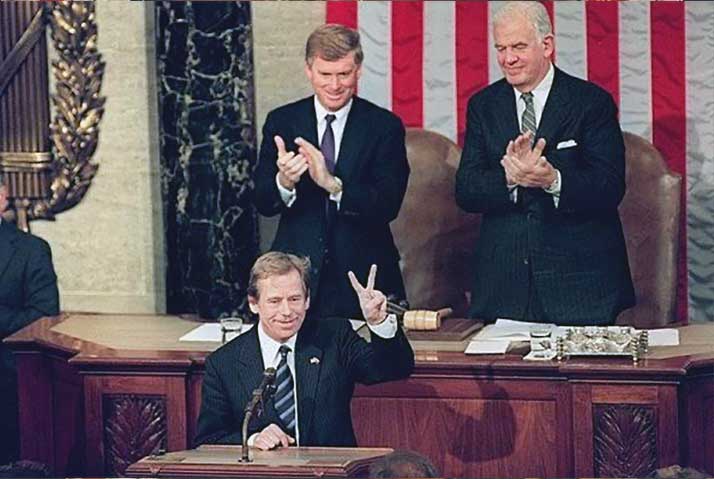Havel Becomes President of Czechoslavakia

Havel Speaking to Congress
The Communist regime of Czechoslovakia yielded to popular demands and allowed free elections. In the election, Vaclev Havel, one of the leading Czech dissidents, was elected President, ending Communist rule in the country. ..
Václav Havel was born on October 5, 1936, in Prague. He grew up in a well-to-do family with a strong intellectual and cultural background. However, his family's bourgeois origins made them a target during the communist regime, and as a result, Havel faced discrimination in his education and career.
Havel became an established playwright and writer,he exploredthemes of human rights, individualism, and the absurdity of life under a totalitarian regime. His works were censored in Czechoslovakia, but they gained international recognition. Havel became a dissident, working for democracy and human rights. He was one of the founders of Charter 77, a manifesto demanding the Czechoslovak government to respect human rights, and was frequently targeted by the regime, leading to many imprisonments.
In November 1989, the fall of the Berlin Wall had a large inpact throughout Eastern Europe, igniting a series of protests leading to political changes. In Czechoslovakia, mass demonstrations began in Prague, demanding an end to the communist rule. The protests were largely peaceful and became known as the Velvet Revolution.
Václav Havel played a crucial role during the Velvet Revolution. He co-founded the opposition movement, Civic Forum, which united various dissident groups and negotiated with the communist government for a peaceful transfer of power. On December 10, 1989, the Communist Party relinquished its monopoly on power, paving the way for a democratic government.
On December 29, 1989, Václav Havel was elected President of Czechoslovakia by the Federal Assembly, becoming the first non-communist president since 1948. His election symbolized the country's break from its totalitarian past and the beginning of a new era of democracy and freedom.
During his presidency, Havel focused on establishing a functioning democracy, rebuilding civil society, and promoting human rights. He oversaw the peaceful dissolution of Czechoslovakia into the Czech Republic and Slovakia, an event commonly referred to as the Velvet Divorce, which took effect on January 1, 1993. Havel then became the first President of the Czech Republic and served in this capacity until 2003.
 >
>